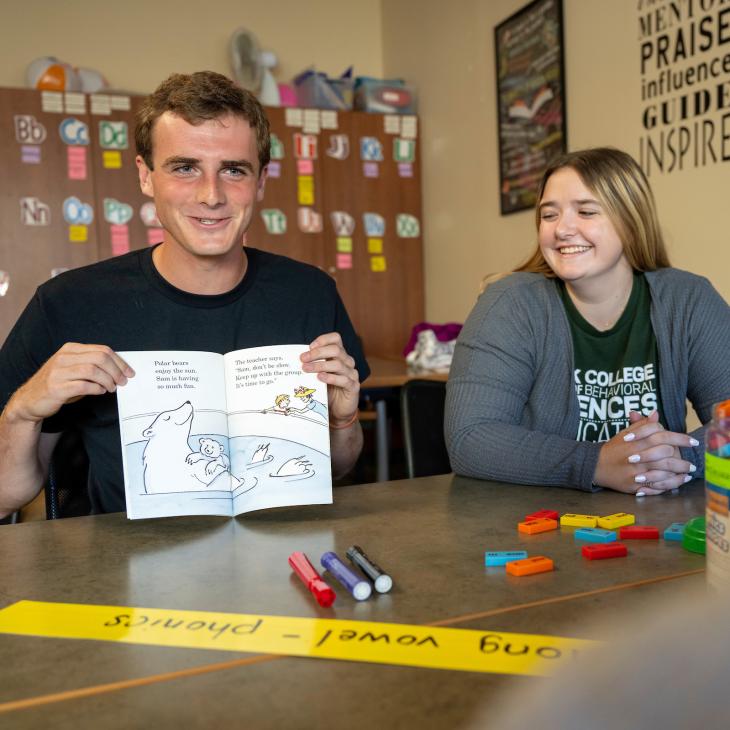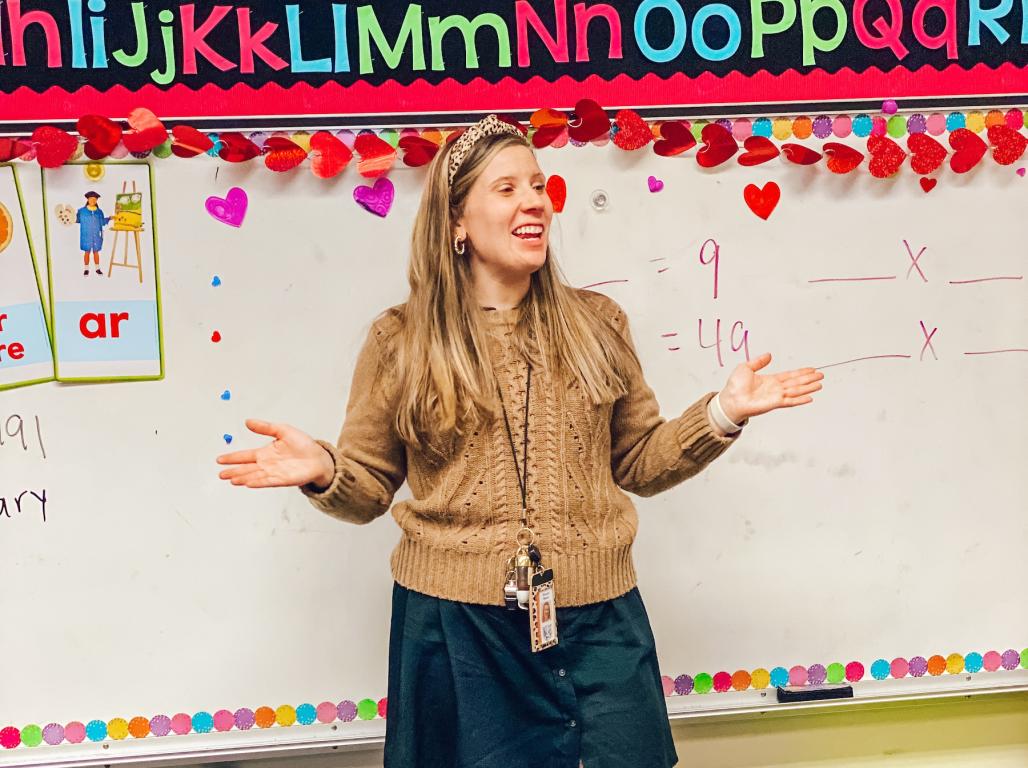Early Elementary Education

Program Type
B.S.
Est. Time to Complete
4 Years
School
School of the Arts, Humanities, Education, and Social Sciences
Delivery Mode
On Campus

As an Early Elementary Education major, you’ll learn about children's cognitive, social, emotional, language, and literacy development from birth to age 9. You’ll also learn strategies to support a wide range of students, including children with special needs and English language learners (ELLs). Throughout it all, you’ll be guided by faculty with real-world experience in K-12 classrooms.
York College students get field experience early in the program. Plus, you’ll end your final semester with student teaching. By the time you graduate, you’ll have planned and taught lessons, managed classrooms, and made lasting connections with potential employers. You’ll also be prepared for licensure in pre-K through grade 4.
About the Bachelor of Science in Early Elementary Education
Prepare to teach young children through a mix of required courses and electives. Your EEE courses will include:
- ECH 210: Educational Technology for Early Elementary Learning
- ECH 220: Instruction and Curriculum Development
- SPE 200: Special Education Processes and Procedure
- EDU 225: Instructional Needs of English Language Learners
- ECH 230: Early Childhood Theory and Practice
- ECH 301: Literacy and Language for Young Children
- ECH 311: Advanced Field Experience
4+1 Graduate Degree Opportunities
As a major in Early Elementary Education, you may also choose to pursue a 4+1 program during your time at York College. This option allows you to complete both a B.S. in Early Childhood Education and an M.Ed. in Applied Behavior Analysis (ABA) in as few as five years.
Looking for a teaching career?
Through this degree program, you'll prepare to get your teaching license for pre-K through fourth grade. You'll also be able to pursue your master's degree.
Early elementary education jobs include:
- Elementary School Teacher
- Preschool Teacher
- Daycare Teacher
- Nonprofit Program Director
- Education Advisor for a Government Agency (e.g., Department of Education
Elementary Education Salary
How much will you earn? The Bureau of Labor Statistics (BLS) reports that kindergarten and elementary school teachers earn an average of $60,660 per year. These teachers generally work with children during school hours. Most do not work during the summer.
Benefits of an Early Elementary Education Degree
Early childhood education is a field with plenty of growth potential. According to the BLS, demand for kindergarten and elementary teachers is expected to increase over the next decade as enrollment increases and many current teachers reach retirement age.
In addition to job security and emotionally rewarding work, early childhood educators tend to enjoy a good work-life balance, with frequent holidays and summer breaks.
No matter which career path you choose, York College will help you to excel before, during, and after your job search.
Field experiences in York College’s Early Elementary Education program work a little differently than what you’ll find at other colleges. Our majors get dedicated course time for visiting their schools, and field experiences will not interfere with other education courses.
YCP students are placed into classrooms in York, Adams, and Cumberland County school districts to gain practical teaching experience as they progress through the program. In their final year, students also engage in a semester-long student teaching experience under the supervision of a cooperating teacher and a college supervisor.
As you plan your schedule of on-campus classes and field experiences, you’ll be advised by your own faculty members in the Education Department — not a centralized advising office removed from the major — so you’ll receive guidance focused on both fulfilling degree requirements and nurturing your growth as an educator.
Students in the Early Elementary Education program have the opportunity to work side-by-side with faculty on joint research projects, and may even serve as research assistants.
Twice per year, the Education Department also hosts children and families from the York Area Down Syndrome Association (YADSA) on campus. Students from several education classes get hands-on experience as they engage the children in learning activities and spend time getting to know these young members of our community.
Student organizations offer additional opportunities for education majors who want to get involved. Many EEE students take part in the Student Education Association (SEA), Kappa Delta Pi Education Honor Society, and/or the Education Ambassadors program.
Our bachelor of science in Early Elementary Education helps students build skills in:
- Cognitive, social, and emotional development of young children
- Language and literacy development of children from birth through age 9
- Teaching methods
- Addressing students with special needs
- Strategies for English Language Learners
EEE Minors
Students who pursue a degree in Early Elementary Education often choose complementary minors or secondary degrees. These may include:
An Accredited Early Elementary Education Degree
York College is fully accredited by the Middle States Commission on Higher Education, which accredits schools and colleges in the Middle States region. This includes Delaware, DC, Maryland, New Jersey, New York, and Pennsylvania. Accreditation by one of the six regional accrediting associations in the United States indicates that the school or college has been carefully evaluated and found to meet standards agreed upon by qualified educators.
Early Elementary Education Courses
Your class schedule will include core courses for your major, Gen Next general education classes, and electives.
| Course Name | Course Code | Credits |
|---|---|---|
| Educational Technology for Early Elementary Learning | ECH 210 | 3 Credits |
| Instruction and Curriculum Development | ECH 220 | 3 Credits |
| Special Education Processes and Procedure | SPE 200 | 3 Credits |
| Early Childhood Theory and Practice | ECH 230 | 3 Credits |
| Advanced Field Experience | ECH 311 | 2 Credits |
Careers in Early Elementary Education
A bachelor’s degree in Early Elementary Education opens up a variety of career opportunities. Some of your options may include:
Elementary School Teacher
Preschool Teacher
Daycare Teacher
Nonprofit Program Director
Education Advisor for a Government Agency

Build your dream career, one day at a time.
This is day one. From your first semester on campus through graduation day, York College offers expert advice, professional development opportunities, and personalized support to help you navigate the choices that influence your future.
Explore resources for a successful college experience:
Meet the Faculty
View All FacultyEarly Elementary Education in Action
View All NewsRelated Programs
Early Elementary Education/Special Education
In this dual program at York College, you’ll complete a double major in Early Elementary Education and Special Education. As you learn about educational theory and gain hands-on practice, you’ll develop an appreciation for the differences your future students may bring to the classroom. And you’ll build the skills needed to support each of them, including those with special needs and English language learners.
Middle Level Education
As a Middle Level Education major at York College, you graduate professionally certified to teach grades 4-8 and have the opportunity to specialize in a core subject: English/Language Arts, Mathematics, Social Studies, or Science. Relationships with faculty and experience working in real schools establish your confidence in educating and managing your own classroom.
Middle Level/Special Education
Broaden your resume with a background in both general education for middle school students and special education. Middle Level majors can study one of four concentration areas: English/Language Arts, Math, Science, or Social Studies. This degree prepares students for professional teacher certification in both middle level education (grades 4-8) and special education (PreK-grade 8).








